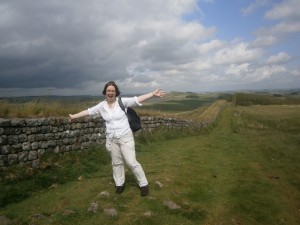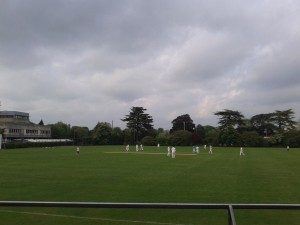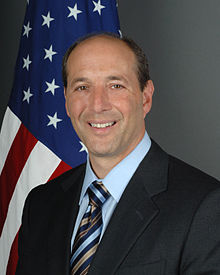
Catherine Sheard, 2012-2013, United Kingdom, posing along Hadrian’s Wall about 50 miles into the trail between Housesteads Roman Fort and Crag Lough, England
(Photo courtesy of Eliza Gettel)
Once every two weeks, I leave the office early, walk down to the field behind my department, and score-keep a cricket match. Cricket enthusiasts are almost exclusively fit, well-coordinated middle-aged men from the Commonwealth, which I most definitely am not. It turns out that you don’t need to be able to actually play cricket in order to score it. You just need to count accurately, to bellow loudly, and to stay sober until the end of the match; something I, a brash non-drinker with a degree in mathematics, can handle.
After almost a year of living in the United Kingdom—and almost an entire season of cricket—I now know my wickets from my overs and my byes from my leg byes, not to mention my “pants” from my “trousers” and my “chips” from my “crisps.” I came to England on a Fulbright Study/Research grant to begin a Ph.D. in Zoology, based at the University of Oxford’s Grey Institute of Ornithology, and here I have learned much about birds, sports, and life itself.
If you do it properly, earning a Ph.D. is a lot like scoring cricket. There’s a lot of tedium, yes, but then there’s also a lot of excitement. I spend about half of my time programming a computer to simulate avian evolution and the other half measuring the dusty carcasses of birds killed in the 1800’s, but really, what I’m studying is sexual selection, the reproductive success of a creature determined by how melodious its song is or how brightly colored its feathers are. Comparing Cricket to my research, there are always going to be dot ball moments, times where a worthy ball is ‘bowled’ but without a run resulting from it. But there are also the ‘sixes’ (an automatic six run score from hitting the boundary mark) when the batter’s on 29 runs, which can be as exciting as the simulation that finally runs and condenses pages of code and megabytes of data into a simple statistical statement about evolution.

Catherine Sheard, 2012-2013, United Kingdom, watches the “Zoology Crickets” (fielding) versus IT (batting) in Oxford, England
Over the course of my Fulbright year, I’ve had my fair share of touring castles and cathedrals, geeking out over “Harry Potter” and “Dr. Who,” and trying (unsuccessfully) to catch a glimpse of the Royal Family. But the United Kingdom is about so much more than the tourism brochures suggest. During my time as a Fulbrighter, I discovered the plight of a minority language by taking Welsh lessons, appreciated the realities of independence by visiting the Scottish Parliament, reconnected with history by walking from one side of England to the other along the path of Hadrian’s Wall, learned the most about everyday Englishmen by eavesdropping on conversations during long bus rides, and experienced the United Kingdom’s healthcare system firsthand during one particularly dramatic trip to A&E (British for “emergency room”).
My advice to prospective Fulbrighters is to think hard about the following three questions:
(1) Why is your research important?
(2) Why is it important for you to do this research?
(3) Why is it important for you to do this research in this country?
And my advice to those about to embark on their Fulbright journeys is this: be open to new experiences. For example, you never know when you’re going to fall in love with some weird new sport.


2 Comments
Congratulations, really a useful story, and your three questions will help me preparing myself as an applicant for the next Fulbright grant
Catherine,
Thank you so much for writing a witty and exciting piece about your Fulbright year! No doubt your 3 questions will help prospective Fulbrights!
All the best,
Arianna